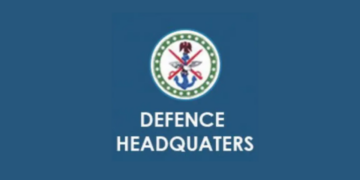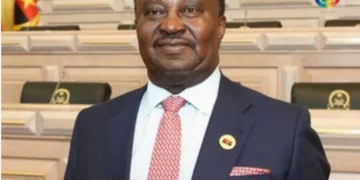The federal government has promised that the insurance companies in the country will compensate banks whose properties were destroyed by the aggrieved customers as long as those properties were adequately insured.
The aggrieved customers protested against the scarcity of the new N200, N500 and N1,000 notes as the Central Bank of Nigeria (CBN) refused to shift its February 17, 2023 deadline for the old money to be used as legal tender, despite a Supreme Court judgement mandating the use of the old currency side by side with the new ones.
However, President Muhammadu Buhari finally ordered reintroduction of the old N200 into the system which would become legal tender until April 2023.
Hence, experts have put the cost of the destruction to rise above N2billion, of which insurers will pay claims.
To this end, the federal government through the commissioner for Insurance/CEO, National Insurance Commission (NAICOM), Mr Sunday Thomas, sympathised with banks and other companies whose properties were destroyed by the protesters, promising that insurance industry, as a risk mitigator, will rise up to the occasion by paying genuine claims.
He equally called for calm among Nigerians over the scarcity of the new notes as the CBN and government were working round the clock to address the issue.
LEADERSHIP had earlier reported that insurance companies in the country are expected to receive claims request of about N2billion or more from commercial banks whose branches were vandalised, burnt and properties destroyed during the new naira scarcity protest.
Speaking in an interview with LEADERSHIP at the weekend, Thomas said: “Its unfortunate and these are unintended consequences. It has happened, of course, but I am assuring you that the insurance sector would be alive to their responsibilities.
“Insurance is to support when the unexpected happens, and when it has happened like this, the insurance sector will compensate. All I hope is that the insurance gap is narrowed as people begin to see the need to pick up insurance policies for their assets and lives. It is incidences like this that will make people begin to feel the presence of insurance and that insurance get boosted.”
He added that once the banking industry comes up with their claims requests, the insurance industry will assess the genuiness of the claims and once those risks are adequately covered, the insurers of such banks must pay the due claims.
LEADERSHIP findings show that about eight or more banks in the country had their premises and assets vandalised by protesters some of whom are old and new generation banks.
Further investigation, however, showed that the banks are yet to approach their insurers for claims, as they are already collating and assessing the level of destruction with a bid to put cost to those damage.
In the next couple of weeks, a credible source in the banking sector expected the banks to approach their insurers for claims.
While some of the banking premises were burnt, some had their cars and other properties within the premises vandalised, while some Automated Teller Machines(ATMs) were equally vandalised across the country.
In the earlier LEADERSHIP reports, it was gathered that the claims also include the banks and companies who had business Interruption insurance coverage and have their businesses affected by the protest.
Aside banks’ properties, findings show that there were other companies, individuals and government properties that were damaged nationwide by protesters of which few of them too were insured.
To this end, some bank branches did not open for a couple of weeks, while some only ran skeletal services for fear of being mobbed, hence, are entitled to claims should they have business interruption insurance in place.
The naira crisis sparked violent protests in parts of the country that lasted for weeks as some bank branches were vandalised and properties , including vehicles and Automated Teller Machines (ATMs), among others, were vandalised.
While there were reported cases of the Sapon, Abeokuta, Ogun State branch of First Bank, and Wema Bank branch in Ibadan, Oyo State, vandalised by irate mob protesting Naira scarcity, there were other unreported cases of vandalisation across some bank branches nationwide.
Similarly, such vandalism was reported in Sagamu, Ogun State, Edo State, Osun State, Lagos State and some states in the South East, among others.
LEADERSHIP’s investigation revealed that virtually all the bank branches nationwide have one form of insurance coverage or the other, with the most prevalent coverage being Fire, Burglary and Theft as well as Business Interruption insurances. However, we could not confirm whether those coverage have an extension to cover riot or civil commotion.
While banks are currently taking stock of what is happening with the aim to lodge claims through either their insurance brokers or directly to the underwriters, insurers said they are assessing the ongoing situation, praying the destruction doesn’t extend beyond what has already happened.
While envisaging that the claims coming from this protest would not be up to N20 billion claims the industry paid during the EndSARS protests, insurers who spoke to LEADERSHIP assured that underwriters are ready to settle claims of banks and other damaged properties as long as they were adequately insured.
Speaking to LEADERSHIP, the director general, Nigerian Insurers Association (NIA), Mrs. Yetunde Ilori, assured that insurance companies will honour claims obligation arising from this crisis as long as the banks and other victims have the right insurance coverage.
According to her, “Provided the banks have an extension on their insurance to cover riot and civil commotion, insurers would pay the claims. I believe the banks must have placed their insurances through credible brokers and insurance companies, and if that is the case, there is no cause for alarm.
“Though, we don’t pray that this situation continues, I don’t believe the magnitude of destruction would be up to that of EndSARS, and if operators could pay that of EndSARS, they will definitely pay this as well,” she said.




